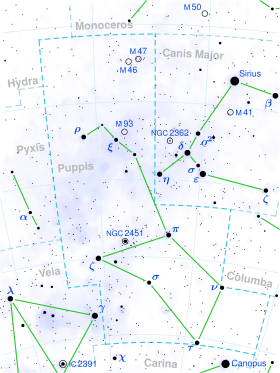HD 70060
Appearance
| Observation data Epoch J2000 Equinox J2000 | |
|---|---|
| Constellation | Puppis |
| Right ascension | 08h 18m 33.31299s[1] |
| Declination | −36° 39′ 33.4391″[1] |
| Apparent magnitude (V) | 4.45[2] |
| Characteristics | |
| Spectral type | A8V[3] |
| U−B color index | +0.11[2] |
| B−V color index | +0.22[2] |
| Astrometry | |
| Radial velocity (Rv) | +6.40[4] km/s |
| Proper motion (μ) | RA: -110.33[1] mas/yr Dec.: +100.48[1] mas/yr |
| Parallax (π) | 34.93 ± 0.18 mas[1] |
| Distance | 93.4 ± 0.5 ly (28.6 ± 0.1 pc) |
| Absolute magnitude (MV) | 2.16[5] |
| Details | |
| Mass | 1.62[6] M☉ |
| Radius | 1.8[6] R☉ |
| Luminosity | 11.39[5] L☉ |
| Surface gravity (log g) | 4.28[7] cgs |
| Temperature | 7,986[7] K |
| Metallicity [Fe/H] | -0.02[8] dex |
| Rotational velocity (v sin i) | 129[9] km/s |
| Other designations | |
| Database references | |
| SIMBAD | data |
HD 70060 is a class A8V[3] (white main-sequence) star in the constellation Puppis. Its apparent magnitude is 4.45[2] and it is approximately 93.4 light years away based on parallax.[1]
References
[edit]- ^ a b c d e f Van Leeuwen, F. (2007). "Validation of the new Hipparcos reduction". Astronomy and Astrophysics. 474 (2): 653–664. arXiv:0708.1752. Bibcode:2007A&A...474..653V. doi:10.1051/0004-6361:20078357. S2CID 18759600. Vizier catalog entry
- ^ a b c d Ducati, J. R. (2002). "VizieR Online Data Catalog: Catalogue of Stellar Photometry in Johnson's 11-color system". CDS/ADC Collection of Electronic Catalogues. 2237. Bibcode:2002yCat.2237....0D.
- ^ a b Gray, R. O.; Corbally, C. J.; Garrison, R. F.; McFadden, M. T.; Bubar, E. J.; McGahee, C. E.; O'Donoghue, A. A.; Knox, E. R. (2006). "Contributions to the Nearby Stars (NStars) Project: Spectroscopy of Stars Earlier than M0 within 40 pc--The Southern Sample". The Astronomical Journal. 132 (1): 161–170. arXiv:astro-ph/0603770. Bibcode:2006AJ....132..161G. doi:10.1086/504637. S2CID 119476992.
- ^ Gontcharov, G. A. (2006). "Pulkovo Compilation of Radial Velocities for 35 495 Hipparcos stars in a common system". Astronomy Letters. 32 (11): 759–771. arXiv:1606.08053. Bibcode:2006AstL...32..759G. doi:10.1134/S1063773706110065. S2CID 119231169.
- ^ a b Anderson, E.; Francis, Ch. (2012). "XHIP: An extended hipparcos compilation". Astronomy Letters. 38 (5): 331. arXiv:1108.4971. Bibcode:2012AstL...38..331A. doi:10.1134/S1063773712050015. S2CID 119257644. Vizier catalog entry
- ^ a b Allende Prieto, C.; Lambert, D. L. (1999). "Fundamental parameters of nearby stars from the comparison with evolutionary calculations: Masses, radii and effective temperatures". Astronomy and Astrophysics. 352: 555–562. arXiv:astro-ph/9911002. Bibcode:1999A&A...352..555A. Vizier catalog entry
- ^ a b David, Trevor J.; Hillenbrand, Lynne A. (2015). "The Ages of Early-Type Stars: Strömgren Photometric Methods Calibrated, Validated, Tested, and Applied to Hosts and Prospective Hosts of Directly Imaged Exoplanets". The Astrophysical Journal. 804 (2): 146. arXiv:1501.03154. Bibcode:2015ApJ...804..146D. doi:10.1088/0004-637X/804/2/146. S2CID 33401607. Vizier catalog entry
- ^ Gontcharov, G. A. (2012). "Dependence of kinematics on the age of stars in the solar neighborhood". Astronomy Letters. 38 (12): 771–782. arXiv:1606.08814. Bibcode:2012AstL...38..771G. doi:10.1134/S1063773712120031. S2CID 118345778. Vizier catalog entry
- ^ Hoffleit, D.; Warren, W. H. (1995). "VizieR Online Data Catalog: Bright Star Catalogue, 5th Revised Ed. (Hoffleit+, 1991)". VizieR On-line Data Catalog: V/50. Originally Published in: 1964BS....C......0H. 5050. Bibcode:1995yCat.5050....0H.

